 People view surgical robots at the World Intelligence Congress in north China's Tianjin municipality, May 20, 2021. (PHOTO / XINHUA)
People view surgical robots at the World Intelligence Congress in north China's Tianjin municipality, May 20, 2021. (PHOTO / XINHUA)
BEIJING - At a logistics center belonging to a healthcare group in China, autonomous mobile robots carry shelves and containers out of the warehouse, a task that previously required human workers to take about 30,000 steps each day.
The artificial intelligence (AI) robots, developed by Chinese AI company Megvii, helped this logistics center reduce labor difficulties and costs, improve working efficiency, and promote its transformation from automation to intelligence.
Changsha, capital of central China's Hunan province, has been a trial ground for several categories of smart vehicles, including self-driving buses running on China's first open-road smart-bus demonstration line, according to a spokesperson with Xiangjiang Smart Tech Innovation Center.
READ MORE: China emerging as global AI pioneer
The smart-bus demonstration line, built by Xiangjiang New Area, is 7.8 km long and features 22 stops in both directions. However, the driver's seats are not empty, but are occupied by "safety personnel."
Scenario innovation of AI in key industries will promote the deep integration of AI and the real economy, and lay a solid foundation for China's high-quality development
Fu Yingbo, President of Chinese AI company Megvii
The throttle, brakes, steering wheel and gear lever in these autonomous vehicles are all managed by computers, allowing the "driver" to keep a better eye on events during test drives, according to He Jiancheng, one of the safety personnel.
"My main task is to deal with any unpredictable situations that the vehicle may encounter," he said.
Seeking to accelerate the development of AI applications and boost economic growth, China's Ministry of Science and Technology recently announced the first batch of 10 AI demonstration application scenarios, including smart farms, smart factories and autonomous driving.
"AI technology must be combined with application scenarios if it is to play its greatest role," said Ren Aiguang, an official with the Ministry of Industry and Information Technology. "China's advantage in AI development lies in its rich application scenarios created during the intelligent upgrading of the real economy."
ALSO READ: Saudi, Chinese firms sign deal on space tech, AI cooperation
At the World Robot Conference 2022, more than 500 sets of intelligent robots were deployed in simulation application scenarios for various industries, including cutting-edge biomimetic robots, medical robots and agricultural robots.
Robots such as intelligent refueling robots and bionic finless porpoises based on aviation technology have attracted much attention. The intelligent refueling robots, for example, can be deployed at unmanned gas stations.
READ MORE: Chinese self-driving company licensed to provide taxi service
"Accelerating scenario innovation is the key driving force to boost AI technology and industrial development. The scenario innovation of AI in key industries will promote the deep integration of AI and the real economy, and lay a solid foundation for China's high-quality development," said Fu Yingbo, president of Megvii.


